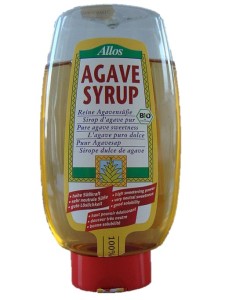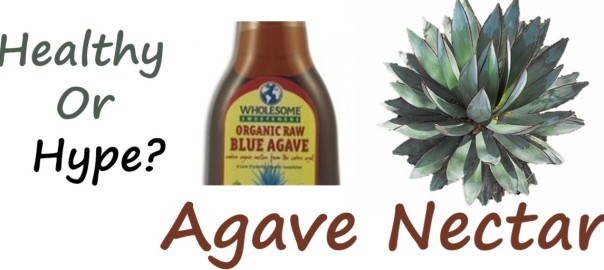It’s hard for me to ignore trends in recipe ingredients. Lately, “health conscious” cooks, food bloggers, and chefs are using particular ingredients claiming that it makes their dishes healthier. For example, coconut oil is a current popular ingredient (I’ve covered the questionable health benefits of coconut oil here).
Agave nectar is another popular ingredient that some cooks are using as a sugar substitute. Is it a healthy choice?
 What Is Agave Nectar?
What Is Agave Nectar?
Agave nectar (also called agave syrup) comes from aquamiel (honey water), a substance found at the core of the blue agave cactus. Processing the aquamiel produces a light colored syrup. Agave is about 1.5 times sweeter than sugar.
The Claims
If you are confused about the potential health benefits of agave nectar, you have good reason! Fad health gurus like Dr. Oz who argued for the benefits of agave over other sweeteners, now rank agave as a sweetener to avoid because of its high fructose content.
Initially, natural health enthusiasts recommended agave nectar because it was “natural,” and low on the glycemic index scale, meaning it didn’t raise blood sugar as much as other sweeteners. Also, because agave is sweeter than sugar, the thinking was that people would use less of it.
Other claims about the benefits of agave nectar range from weight loss to wound healing, to benefits from potential anti-inflammatory compounds present in the agave plant.
The Evidence
 Glycemic Index. Although agave nectar has a lower glycemic index than other sweeteners, the influence of this measure on health has come into question recently: the glycemic index is only one aspect of a food, and when that food is consumed with others, it might not be relevant. Also, this recent study suggested that a low glycemic index diet didn’t improve insulin sensitivity, cholesterol, or other heart disease risk factors for people who are already following a healthful diet.
Glycemic Index. Although agave nectar has a lower glycemic index than other sweeteners, the influence of this measure on health has come into question recently: the glycemic index is only one aspect of a food, and when that food is consumed with others, it might not be relevant. Also, this recent study suggested that a low glycemic index diet didn’t improve insulin sensitivity, cholesterol, or other heart disease risk factors for people who are already following a healthful diet.
In general, judging whether a food is nutritious or not based on one measure, like the glycemic index, is not a good idea!
High Fructose. The high fructose content responsible for the lower glycemic index of agave might be a concern. Most fad health gurus who recommended agave enthusiastically (e.g., Dr Oz or Dr. Weil) changed their tune when they found out that agave has a very high fructose content compared to other sweeteners (much higher than high fructose corn syrup, the much vilified sweetener in soft drinks).
In some circles, fructose has been called poison and blamed for the obesity epidemic, but the evidence doesn’t support this sweeping statement. Fructose is metabolized differently than other sugars, and studies suggest that high intakes could raise triglycerides, predisposing individuals to fatty liver disease, insulin resistance, and heart disease. But these studies were mostly in animals, and looked at very high doses of 100% fructose, which is not how fructose is consumed in a typical diet (most sweeteners are a combination of glucose and fructose).
We are still learning how different sugars are metabolized in humans, which is complex when you consider other foods in the diet, individual variations, and physical activity levels. But most experts agree that the total amount of sugar consumed, and not the type, is the greatest concern for health.
Is agave nectar “natural”? Although agave nectar is from the agave plant, it is highly processed to deliver a refined and clear syrup, and it’s hard to argue that it is natural. Sugar is processed out of “natural” sugar cane, but no one calls sugar natural. In both cases, the processing removes fiber and concentrates sugars.
Agave Nectar: Bottom Line
Use agave nectar in small quantities if you like the taste of it, or if it truly benefits your recipe, but don’t fool yourself into thinking it’s healthier than other sweeteners. Whether you need to worry about the nectar’s high fructose content is debatable.
While many believe that “natural sweeteners” are healthier, they aren’t. See this article for an in depth look at this topic.
In terms of overall health, your best bet is to reduce consumption of all sugars. Also important to consider is your activity level: sugar is metabolized differently in athletes, especially during and after exercise (because contracting muscles use sugar as a fuel source). It seems that a smart plan would be to make physical activity a priority, and indulge your sweet tooth when you’re moving, instead of when you’re sitting for hours on end.
Other Foods in the Healthy or Hype Series . . .
- Healthy or Hype? Natural Sweeteners
- Healthy or Hype? Protein Powder
- Healthy or Hype? Almond Milk
- Healthy or Hype? Buttered/Bulletproof Coffee
- Healthy or Hype? Veggie Chips
- Healthy or Hype? Chocolate Milk for Recovery
- Healthy or Hype? Coconut Oil
More Healthy or Hype topics.
Share This:

